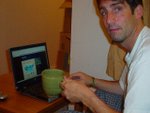Today he took on a non political subject and ventured into an area of thought that I ponder extensively. Brooks talks about the unmistakable Spirituality people feel and now can be measured scientifically. Brooks predicts (correctly, I hope) that future debates over Spirituality will NOT be about God or Spirituality but about modern religious organizations and belief structures. He welcomes the scientific evidence that shows that Spirituality is real and understands how, for many, the specific teaching of the Bible and Christianity inadequately addresses it. He predicts a convergence of science and Spirituality and calls it "Neural Buddhism". His description of this way of viewing things amazingly corresponds with what I have had running around my mind for years. Bravo David Brooks!!
Here is an excerpt of his article but you should read the entire thing here.
If you survey the literature you can see that certain beliefs will spread into the wider discussion. First, the self is not a fixed entity but a dynamic process of relationships. Second, underneath the patina of different religions, people around the world have common moral intuitions. Third, people are equipped to experience the sacred, to have moments of elevated experience when they transcend boundaries and overflow with love. Fourth, God can best be conceived as the nature one experiences at those moments, the unknowable total of all there is.The real challenge is going to come from people who feel the existence of the sacred, but who think that particular religions are just cultural artifacts built on top of universal human traits. It’s going to come from scientists whose beliefs overlap a bit with Buddhism. In unexpected ways, science and mysticism are joining hands and reinforcing each other. That’s bound to lead to new movements that emphasize self-transcendence but put little stock in divine law or revelation. Orthodox believers are going to have to defend particular doctrines and particular biblical teachings. They’re going to have to defend the idea of a personal God, and explain why specific theologies are true guides for behavior day to day.

No comments:
Post a Comment